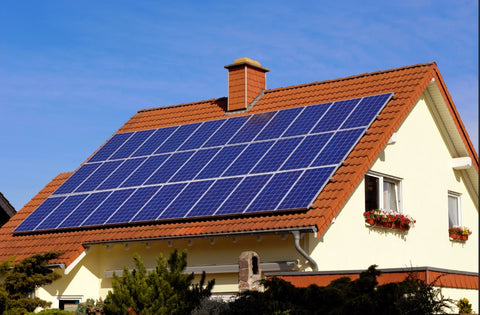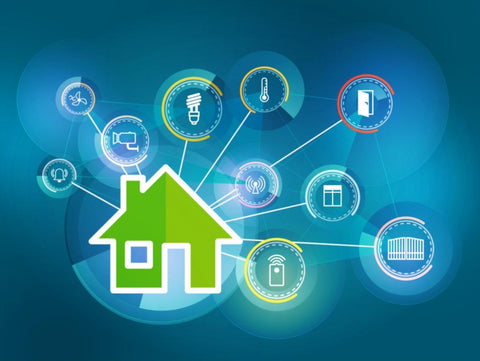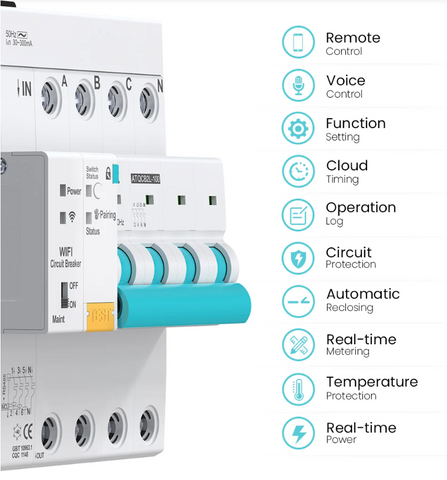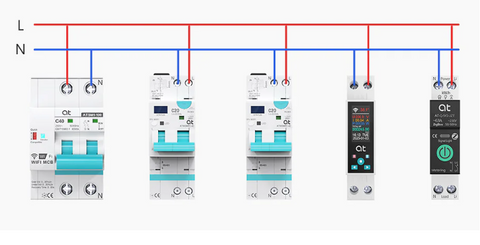Top 4 Benefits of WiFi Circuit Breakers for Solar Systems
Solar panels are a popular and eco-friendly way for people and businesses to use the sun's energy to create electricity. As the adoption of solar panel systems continues to rise, so does the need for advanced monitoring and control solutions.
One such innovation is WiFi-enabled circuit breakers designed to enhance the management and safety of solar electrical panel systems. In this comprehensive guide, we will delve into the world of WiFi circuit breakers for solar panels, exploring their functionality, benefits, drawbacks, and whether they are a necessary addition to your solar energy setup.
What are Solar Panel Systems?

To understand WiFi circuit breakers, it's important to first grasp how solar panel systems work with renewable energy. Solar panels are photovoltaic cells that capture sunlight and convert it into direct current (DC) electricity.
DC electricity is converted to AC electricity using an inverter. This conversion makes it usable for homes, businesses, or sending it back to the grid. To ensure the safety and efficiency of this process, solar panel systems rely on smart circuit breakers as a crucial component.
The Role of Circuit Breakers in Solar Panel Systems
Circuit breakers play a pivotal role in any electrical system, including solar panel setups. Their primary function is to safeguard electrical circuits and devices by preventing overloads and short circuits. In solar panel systems, circuit breakers serve as protective devices, ensuring that the system operates within safe parameters. They help maintain the integrity of the electrical components, preventing damage or potential hazards that can arise from electrical faults.
The Need for WiFi Connectivity in Solar Panel Systems
In recent years, the integration of WiFi connectivity into various home and business technologies has become increasingly popular. Solar panel systems now have WiFi-enabled circuit breakers that are connected to the internet and provide advanced features and capabilities. Is adding WiFi to circuit breakers useful or unnecessary? To answer this question, let's explore the benefits and drawbacks of WiFi circuit breakers for solar panels.
Benefits of WiFi Circuit Breakers for Solar Panels
1. **Remote Monitoring and Management**
Unlike traditional breakers, WiFi circuit breakers provide users with the ability to monitor their solar panel system's performance and status remotely. This is very useful for people who travel often or are away from home or work for a long time. Users can get up-to-date information on energy production, usage, and system health through a special app or website.
2. **Timely Issue Resolution**
The system can send real-time notifications to a user's mobile device or email address in case of system faults or irregularities. This immediate alert system empowers users to take prompt action to rectify issues, potentially preventing more significant problems. The system can notify the user if a solar panel is shaded or not working properly. The user can then fix the problem quickly.
3. **Enhanced Energy Management**
WiFi circuit breakers enable users to manage their energy consumption efficiently. They can remotely turn off specific circuits or devices, optimizing and monitoring energy usage based on solar energy availability and individual preferences. When the sun produces a lot of energy, people can use their phones to turn on power-hungry devices. They can also use their phones to charge electric cars.
4. **Integration with Smart Homes**
Homeowners with smart home systems can seamlessly integrate WiFi circuit breakers. This allows for automation and control of various devices based on the availability of solar energy. When there is a lot of solar energy, the system can change the thermostat or charge electric cars to save energy.
Drawbacks and Considerations

While WiFi circuit breakers offer numerous advantages, they may not be a perfect fit for everyone. When deciding to add a WiFi-enabled circuit breaker to your solar panel system, these factors are important to consider.
1. **Cost**
WiFi-enabled circuit breakers tend to be more expensive than their traditional counterparts. The cost includes not only the price of the device but also potential installation and setup fees. Users must assess whether the added convenience and features justify the higher upfront investment.
2. **Installation Complexity**
Installing and configuring WiFi circuit breakers may require technical expertise. If the system is complex and you're not familiar with electrical installations, you might need a professional electrician's help. Ensuring that we install the system correctly is crucial for its safe and effective operation.
3. **Internet Reliability**
A reliable internet connection is essential for effective remote monitoring and control. If your internet connection frequently experiences outages or lacks reliability, WiFi connectivity may have limited benefits. Consider whether your location and internet service provider can consistently support the requirements of a WiFi-connected system.
4. **Privacy and Security**
As with any connected device, there are privacy and security considerations associated with WiFi circuit breakers. Users must ensure that their network is secure and that they follow best practices for safeguarding their real time data. Manufacturers of WiFi circuit breakers typically implement security features, but users must also take responsibility for protecting their information.
Choosing the Right WiFi Circuit Breaker
If you think a WiFi circuit breaker is useful for your solar panel system, it's important to choose the right one. Consider the following factors when choosing a WiFi circuit breaker:
1. **Compatibility**
Make sure the WiFi circuit breaker works with your solar panel system and other devices or platforms you want to use.
2. **Features**
Different WiFi circuit breakers may offer various features and capabilities. Evaluate which features align with your specific needs and preferences, such as real-time monitoring, alerts, and integration options.
3. **Manufacturer Reputation**
Research the reputation and reliability of the manufacturer. Read reviews and gather feedback from other users to ensure the quality of the product.
4. **Installation and Support**
Decide if you can install and set up the WiFi circuit breaker on your own or if you require professional help. Additionally, inquire about the manufacturer's customer support and warranty policies.
Conclusion
In conclusion, the decision to incorporate a WiFi circuit breaker into your solar panel system depends on your specific requirements, technical capabilities, and budget constraints. WiFi circuit breakers have remote monitoring and control, but not all solar panel owners need them. The primary goal should always be the safe and efficient operation of your solar panel system.
Consider the pros and cons of WiFi circuit breakers, including cost, installation difficulty, internet reliability, and security, before deciding. If you believe the benefits align with your preferences, take the time to consider if it is compatible with your device.
Additionally, evaluate whether it possesses the necessary features and if the company has a good reputation. Lastly, determine if they provide assistance with installation. Whether you pick a WiFi breaker or a regular one, focus on using solar energy responsibly and sustainably. It's good for your wallet and the environment.
Contact:
AT-ELE
sale@at-ele.com
www.at-ele.com





